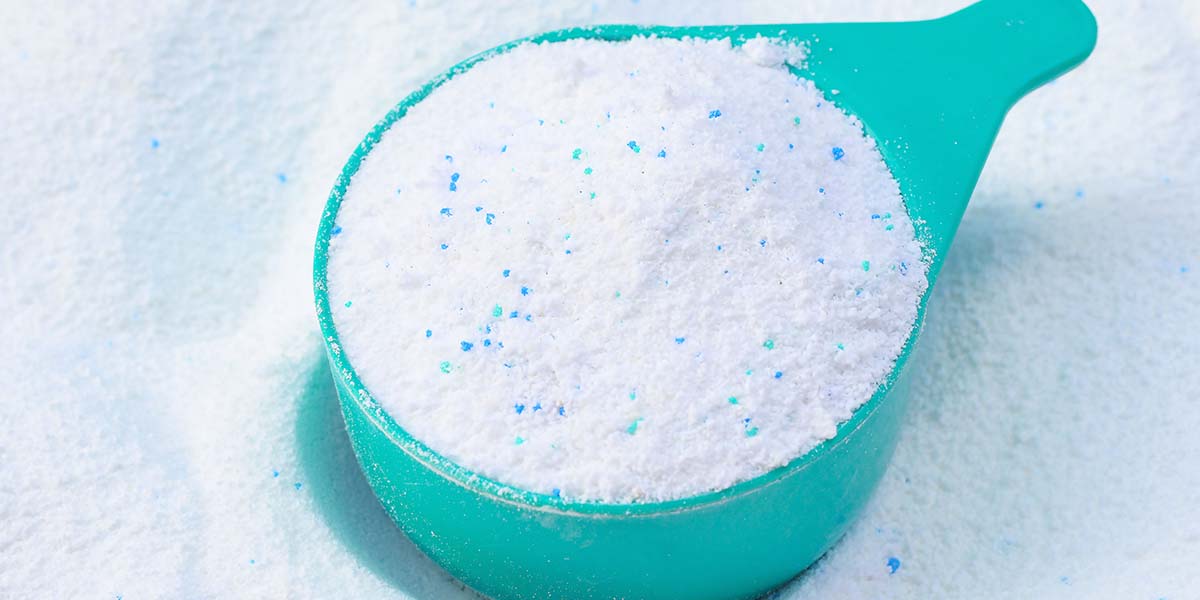If you’ve ever suffered aggravated skin after doing your laundry, wearing your clothes or after a night with clean sheets, there is a chance you might be allergic or sensitive to the chemicals in your laundry detergent. As well as chemicals laundry detergents may also have preservatives, artificial fragrances and dyes in them, which may all be potential irritants to your skin. Some of the common symptoms associated with detergents are tender skin, itching, tingles, rash, little bumps, dry or cracked skin. Less common issues are burning, blistering and swollen skin.
Why Laundry Powder can Cause Skin Problems
You may not realise, but there are a huge number of allergens and irritants that can cause your skin to flare up. They can be found in dozens of everyday items such as laundry detergents, shampoos, soaps, clothing fabrics, metals, certain foods, medication, and certain plants.

One of the key reason’s laundry detergents are such a big offender is the sheer number of chemicals they contain. These include toxic chemicals (such as 1,4-dioxane), preservatives, dyes and artificial fragrances. Unlike food, where it is mandatory to list the ingredients, they are often not listed on detergent products and instead you must go to the manufacturer’s website to understand the contents.
Another reason is the frequency that we use them. Detergent touches all our clothes and linen so the exposure to the chemicals is daily – all day and all night. Whilst some of the chemicals they contain may only present as a mild allergen, the repeat use can mean the severity of the allergy continues to develop over time.
How it can Affect Your Skin
So how do you tell if you have an allergy to your washing powder?
Detergents can trigger skin conditions such as contact dermatitis. As your whole body is generally in contact with your clothes, towels or bedding, symptoms can appear anywhere on your body. Some people may find that their symptoms can be worse in the areas that get wet with sweat such as your groin and armpits.
There are two different types of contact dermatitis: irritant and allergic.

When it comes to detergent, if you are not allergic to any of the ingredients in the detergent, you can still develop ‘irritant’ symptoms such as a rash. Irritant contact dermatitis is the most common form of nonallergic skin rashes and occurs when the irritating substance damages the top layer of your skin, causing an itchy rash.
If you suffer from allergic contact dermatitis, your body produces an immune response to the substance you are allergic to. This can be a variety of symptoms such as a rash, burning or swelling.
If you have sensitive skin, you may be more prone to suffering from the symptoms.
Sensitive skin is caused by a genetic predisposition, and you may find there are other sufferers in your family. The cause is the protective outer layer of your skin (the epidermal lipid barrier) is unable or less effective at blocking allergens and irritants.

People with this genetic predisposition are prone to inflammatory skin conditions including:
- Perioral dermatitis is an inflammatory rash occurring around the mouth, nose, chin and eyes. It is common in women and can be a result of using topical steroid medication.
- Dermatitis. This is a common condition and can occur in a number of forms including eczema and contact dermatitis. Symptoms are itchy dry skin, rash or swollen, reddened skin. The sufferer may experience skin that blisters, oozes, crusts or flakes off.
- Eczema (atopic dermatitis) causes redness, itching, and sometimes infections. The skin does not retain moisture very well, making it prone to allergens and irritants. When the skin gets irritated, it can trigger a release of chemicals that make it itchy.

If you have sensitive skin or have ever suffered a tingling or a rash after using laundry detergent, there are a few steps you can take to minimise the risk of a flare up:
- Review the ingredients that are in your regular detergent (if they are not on pack, they should be on the manufacturer's website). If there is a long list of chemicals, the best thing may be to ditch it.
- Research the options available that use fragrance-free and dye-free detergents. Make sure you read the product reviews. Switch to one of these alternatives and determine if the symptoms disappear. A great alternative could be to switch to a detergent free solution such as Eco Egg.
- If you go to a dry cleaner, you can find Green and Eco-friendly alternatives.

If you want to understand more on allergens and how they make be affecting your skin, you can get in touch with Kiri, founder of AMPERNA®. Kiri can help you understand what might be triggering your dermatitis and breakouts and recommend a holistic approach to your skin health.
You can contact Kiri or sign up for skin coaching.
Sources:
https://www.healthline.com/health/rashes-from-detergent#causes
https://www.allure.com/story/laundry-detergent-allergy-skin-reaction


















